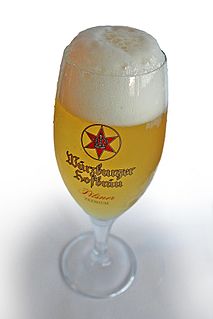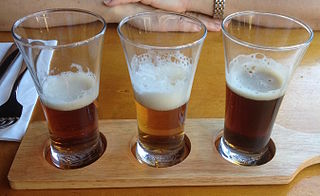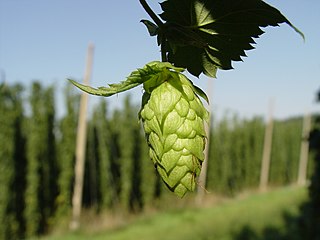Adnams is a regional brewery founded in 1872 in Southwold, Suffolk, England, by George and Ernest Adnams. It produces cask ale and pasteurised bottled beers. Annual production is around 85,000 barrels.

Humulus, hop, is a small genus of flowering plants in the family Cannabaceae. The hop is native to temperate regions of the Northern Hemisphere. Hops are the female flowers of the hop species H. lupulus; as a main flavor ingredient in beer, H. lupulus is widely cultivated for use by the brewing industry.

Homebrewing is the brewing of beer, mead, and ciders on a small scale for personal, non-commercial purposes. Supplies, such as kits and fermentation tanks, can be purchased locally at specialty stores or online. Alcohol has been brewed on the domestic level since its advent, thousands of years prior to its commercial production, although its legality has varied according to local regulation. In the United States, a permit is required to distill spirits such as moonshine.

Wheat beer is a beer, usually top-fermented, which is brewed with a large proportion of wheat relative to the amount of malted barley. The two main varieties are Weissbier, based on the German tradition, and Witbier, based on the Belgian tradition; minor types include Lambic, Berliner Weisse and Gose.

Lambic is a type of beer brewed in the Pajottenland region of Belgium southwest of Brussels and in Brussels itself at the Cantillon Brewery. Lambic beers include gueuze and kriek lambic. Lambic differs from most other beers in that it is fermented through exposure to wild yeasts and bacteria native to the Zenne valley, as opposed to exposure to carefully cultivated strains of brewer's yeast. This process gives the beer its distinctive flavour: dry, vinous, and cidery, usually with a sour aftertaste.

Pale lager is a very pale-to-golden-colored lager beer with a well-attenuated body and a varying degree of noble hop bitterness.

Beer style is a term used to differentiate and categorise beers by factors such as colour, flavour, strength, ingredients, production method, recipe, history, or origin.
Wort is the liquid extracted from the mashing process during the brewing of beer or whisky. Wort contains the sugars, the most important being maltose and maltotriose, that will be fermented by the brewing yeast to produce alcohol. Wort also contains crucial amino acids to provide nitrogen to the yeast as well as more complex proteins contributing to beer head retention and flavour.

Alvinne is a small brewery in the hamlet of Moen near the Belgian city of Zwevegem.

Cascade is one of the many varieties of hops. Cascade hops are the most widely used hops by craft breweries in the United States.
Saaz is a "noble" variety of hops. It was named after the Czech city of Žatec. This hop is used extensively in Bohemia to flavor beer styles such as the Czech pilsener. Saaz hops accounted for more than 2⁄3 of total 2009 hop production in the Czech Republic. It is the main hops variety used in the production of global beer Stella Artois.
When drinking beer, there are many factors to be considered. Principal among them are bitterness, the variety of flavours present in the beverage, along with their intensity, alcohol content, and colour. Standards for those characteristics allow a more objective and uniform determination to be made on the overall qualities of any beer.
Chiswick Bitter is a lower-strength ale produced by London's oldest family brewer, Fuller's. The beer takes its name from the area of London where Fuller's has been based since 1845.

Samuel Adams is the flagship brand of the Boston Beer Company. The brand name was chosen in honor of Founding Father Samuel Adams. Adams inherited his father's brewery on King Street. Some histories say he was a brewer, while others describe him as a maltster. The Samuel Adams brewery is located in Boston, Massachusetts, United States, where visitors can take a tour, and shop beers and merchandise. Samuel Adams beer is brewed by the Boston Beer Company, which was founded by Jim Koch and Rhonda Kallman. Samuel Adams beer was started using a recipe now known as the Samuel Adams Boston Lager.

Devil's Peak Brewing Company is an award-winning South African craft brewery located at the base of the famous Devils Peak mountain in Cape Town.

Ale is a type of beer brewed using a warm fermentation method, resulting in a sweet, full-bodied and fruity taste. Historically, the term referred to a drink brewed without hops.
The Hop Research Center Hüll is a research institution focussing on advances in hop breeding, hop harvesting, and hop chemistry. It is located in the Hallertau, the largest continuous hop-planting area in the world, in the German state of Bavaria. The institute is run by the German Hop Research Society and the Bavarian state.
















